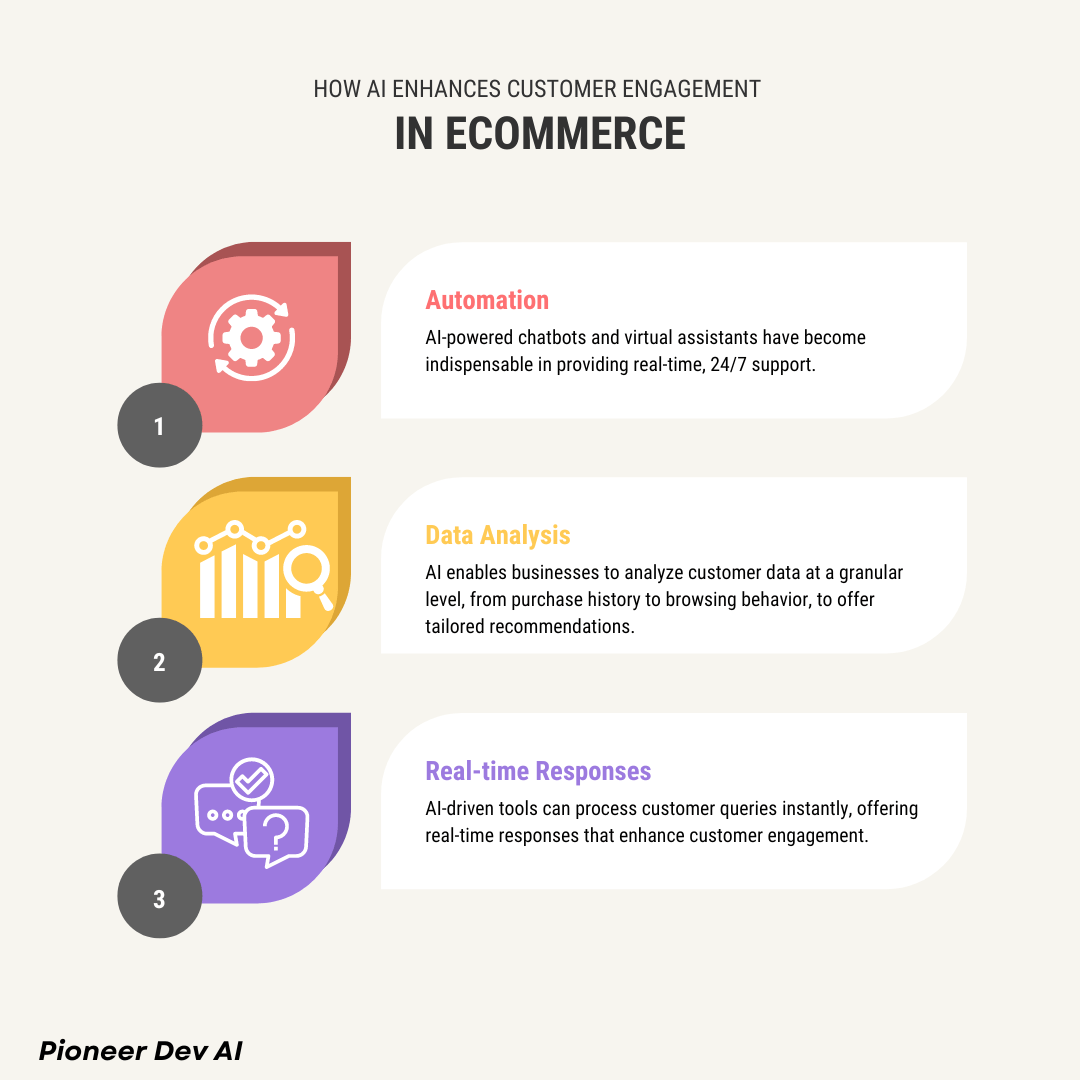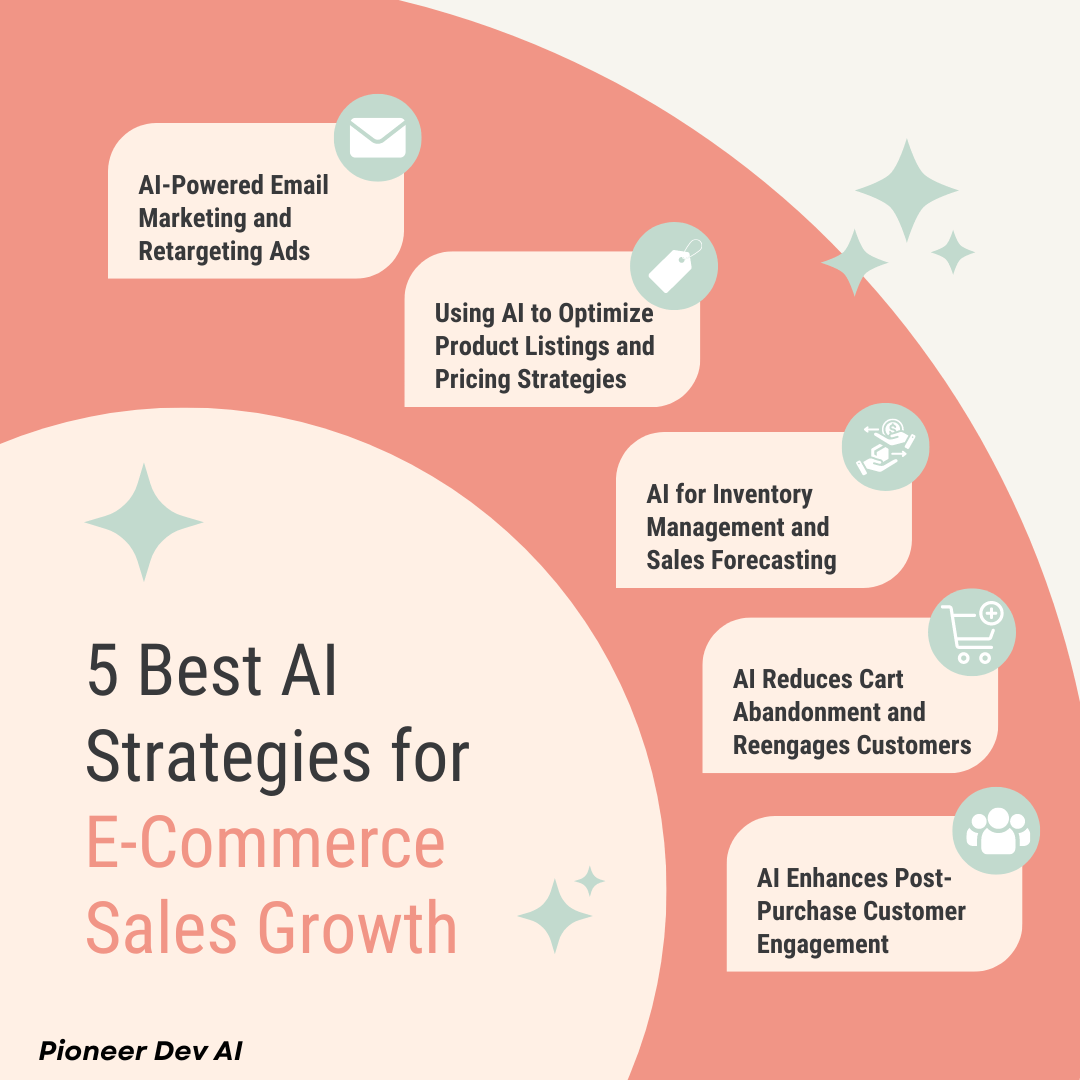Maximizing Customer Engagement with AI: 5 Ways E-Commerce Brands Can Boost Sales
AI in e-commerce is reshaping customer engagement, making interactions more tailored, efficient, and responsive.
In fact, a recent study by Ipsos revealed that 66% of consumers agree that AI-powered products and services will significantly impact their daily lives in the next 3-5 years. This shift is already apparent as more companies integrate AI to enhance customer satisfaction, streamline operations, and drive sales.
Brands that embrace AI are poised to deliver exceptional experiences that not only boost customer retention but also elevate sales and improve brand perception.
If you’re looking to stay competitive in this fast-evolving market, it’s crucial to understand how AI can optimize customer engagement and fuel business growth. Explore the following five AI-driven strategies to unlock the full potential of your e-commerce business.
The Role of AI in E-Commerce Customer Engagement
By leveraging data analysis, automation, and real-time responses, AI equips businesses to anticipate customer needs, streamline operations, and foster long-term loyalty.
What is AI in E-commerce and Why It Matters
AI in e-commerce refers to the application of artificial intelligence technologies, such as machine learning, natural language processing, and predictive analytics, to enhance the online shopping experience. AI enables brands to analyze vast amounts of customer data, predict buying behaviors, and offer hyper-personalized recommendations. This is crucial as today’s customers expect seamless, personalized, and efficient shopping experiences.
According to SuperOffice , 86% of consumers are willing to pay more for better customer experiences, making it clear that businesses that utilize AI to improve interactions can boost customer satisfaction and loyalty, ultimately driving sales.
How AI Enhances Customer Engagement in E-commerce
- Automation: AI-powered chatbots and virtual assistants have become indispensable in providing real-time, 24/7 support. For instance, H&M uses an AI chatbot to assist customers with outfit recommendations and purchase decisions, improving user experience and increasing sales.
H&M’s chatbot leverages AI-driven personalization in e-commerce by acting as a personal digital stylist, asking users questions to understand their preferences while making the process interactive by sharing clothing images for style decisions. It also allows users to browse and vote on pre-existing outfits, tapping into the popularity of social polls. By remembering individual tastes, the chatbot saves customers time and provides personalized recommendations for future retargeting.
- Data Analysis: AI enables businesses to analyze customer data at a granular level, from purchase history to browsing behavior, to offer tailored recommendations. Amazon’s AI algorithms, for example, predict what customers are likely to buy next, which accounts for 35% of their total sales, according to McKinsey.
- Real-time Responses: AI-driven tools can process customer queries instantly, offering real-time responses that enhance customer engagement. For example, Sephora’s Skin IQ tool uses AI to offer personalized skincare recommendations tailored to a customer’s skin type and concerns, providing expert advice through digital channels to foster trust and satisfaction.

5 Best AI Strategies for E-Commerce Sales Growth
To leverage the full potential of AI in e-commerce, brands must adopt targeted strategies like retrieval-augmented generation (RAG) to enhance customer engagement and drive sales growth. AI technologies offer powerful tools to optimize various aspects of e-commerce operations, from marketing and pricing to inventory management.
Here are five AI-driven strategies that can help e-commerce businesses maximize their performance and achieve substantial sales growth.
AI-Powered Email Marketing and Retargeting Ads
AI can significantly enhance email marketing and retargeting efforts by delivering personalized content and timing. AI algorithms analyze customer behavior and preferences to create highly targeted email campaigns that resonate with individual users. For instance, tools like Mailchimp’s Smart Recommendations use AI to suggest relevant products and content based on past interactions.
Additionally, AI-powered retargeting ads can increase conversion rates by reaching out to users who have previously shown interest in your products but have not completed a purchase. A case study by AdZeem found that retargeting ads driven by AI improved conversion rates by up to 70%, demonstrating the effectiveness of these strategies in driving sales.
Using AI to Optimize Product Listings and Pricing Strategies
AI can optimize product listings and pricing strategies by analyzing market trends, competitor pricing, and customer preferences. Machine learning algorithms can dynamically adjust prices to reflect real-time demand and competition, ensuring that prices are competitive and appealing to potential buyers. For example, Dynamic Pricing tools like Prisync use AI to automatically adjust pricing based on market conditions, helping brands stay competitive.
AI also enhances product listings by generating optimized descriptions and images. Tools such as Copy.ai can create engaging and relevant product descriptions, increasing the likelihood of conversions.
AI for Inventory Management and Sales Forecasting
Effective inventory management and sales forecasting are critical for maintaining operational efficiency and meeting customer demand. AI-driven tools can analyze historical sales data, market trends, and seasonal patterns to predict future sales and optimize inventory levels. Solutions like IBM Watson supply chain management use AI to provide actionable insights and improve inventory accuracy.
By forecasting demand more accurately, AI helps prevent overstocking and stockouts, ensuring that products are available when customers want them.
AI Reduces Cart Abandonment and Reengages Customers
Cart abandonment is a significant challenge for many eCommerce businesses, with rates often exceeding 70%. This means that a substantial portion of customers add items to their carts but leave without completing their purchase. Given the time and resources invested in attracting and engaging potential buyers, losing 70% of these sales is a major concern.
Fortunately, AI tools for improving customer experience offer solutions to address this issue. Various AI tools are designed to minimize cart abandonment by analyzing “digital body language” to gauge customer behavior and purchase intent. Just as in-store staff can sense when a customer is hesitating, these AI tools use behavioral insights to deliver targeted promotional messages or additional information, increasing the likelihood of conversion.
Moreover, some AI systems focus on recapturing abandoned carts. These tools leverage machine learning to identify which customers are most likely to respond to abandoned cart reminders or retargeting ads. Even if only a small fraction of these customers return, the increase in sales from reduced abandonment rates can be substantial.
AI Enhances Post-Purchase Customer Engagement
Another way AI can optimize the customer journey is through post-purchase engagement. Maintaining contact with customers after their initial purchase can significantly benefit your business. Engaging customers a few days, weeks, or even months after their first buy can lead to increased repeat business, as returning customers are generally more cost-effective to market to and tend to spend more.
For instance, research shows that customers often spend 67% more during their 31st to 36th months of engagement with a company compared to their first six months. Additionally, reducing customer churn by just 5% can boost profits by 25-125%. AI-driven strategies that facilitate ongoing engagement and foster customer loyalty can thus have a profound impact on your long-term revenue and growth.

Conclusion
In today’s competitive e-commerce landscape, leveraging AI is essential for brands that want to stand out and drive growth. To increase e-commerce conversions with AI, businesses can implement strategies like personalized customer engagement, dynamic pricing, and smart retargeting. These AI-powered tools not only transform how businesses interact with customers and manage operations but also help reduce cart abandonment, boost customer loyalty, and significantly improve sales.
At PioneerDev AI , we specialize in helping e-commerce brands harness the power of AI to optimize every aspect of their business. Whether you’re looking to streamline operations, enhance customer experiences, or increase conversions, our tailored AI solutions can give you the edge you need.

